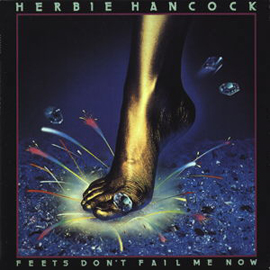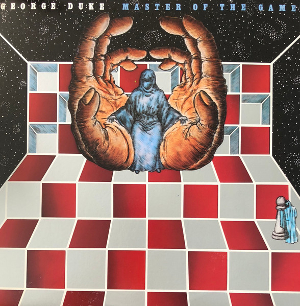
Head Hunters is the twelfth studio album by American pianist, keyboardist and composer Herbie Hancock, released October 26, 1973, on Columbia Records. Recording sessions for the album took place in the evening at Wally Heider Studios and Different Fur Trading Co. in San Francisco, California.

Dis Is da Drum is Herbie Hancock's thirty-ninth album and his first solo album since leaving Columbia Records. Guests include saxophonist Bennie Maupin, trumpeter Wallace Roney and flautist Hubert Laws.

Secrets is a jazz-funk fusion album by keyboard player Herbie Hancock. It is also Hancock's seventeenth album overall. Participating musicians include saxophonist Bennie Maupin and guitarist Wah Wah Watson.

Sextant is the eleventh studio album by Herbie Hancock, released in 1973 by Columbia. It is the last album with the Mwandishi-era sextet featuring saxophonist Bennie Maupin, trumpeter Eddie Henderson, trombonist Julian Priester, bassist Buster Williams and drummer Billy Hart. Synthesizer player Patrick Gleeson and percussionist Buck Clarke also appear.

Mwandishi is the ninth album by jazz pianist Herbie Hancock, released in 1971. It is the first album to officially feature Hancock’s ‘Mwandishi’ sextet consisting of saxophonist Bennie Maupin, trumpeter Eddie Henderson, trombonist Julian Priester, bassist Buster Williams and drummer Billy Hart.

Thrust is the fourteenth studio album by American jazz-funk musician Herbie Hancock, released in September 1974 on Columbia Records. The album reached No. 2 on the Billboard Top Soul Albums chart and No. 13 on the Billboard 200 chart. It is the second album featuring The Headhunters: saxophonist Bennie Maupin, bass guitarist Paul Jackson, drummer Mike Clark and percussionist Bill Summers.

Lite Me Up is a pop album with a strong disco-funk feel by Herbie Hancock. It was Hancock's first release without producer David Rubinson since 1969. On this album, Hancock was influenced by his long-time friend, producer Quincy Jones and sessions included many musicians associated with Jones including Steve Lukather and Jeff Porcaro of Toto. The album was the first on which Hancock played the Synclavier, a digital polyphonic synthesizer.

Magic Windows is the twenty-sixth album by jazz pianist Herbie Hancock, released on September 29, 1981, on Columbia. This album continues his collaboration with associate producer Jeffrey Cohen, who co-wrote four of the tracks on the album. Additionally, the track "Satisfied with Love" was co-written by his sister, Jean Hancock. Musicians involved in this album include guitarists Wah-Wah Watson, Ray Parker Jr. and Adrian Belew, vocalist Sylvester and percussionists Sheila E. and Paulinho da Costa.

Mr. Hands is the twenty-fourth album by Herbie Hancock. Unlike the preceding album, Monster, which was conceptualized as a dance album, Mr. Hands is a collection of different musical styles with distinct groups. It features bass guitarist Jaco Pastorius on the track "4 A.M.," plus multiple guests including Bennie Maupin, Sheila E. and Ron Carter, plus an all-synthesizer track ("Textures") performed entirely by Hancock. "Shiftless Shuffle" was recorded by the members of the Headhunters quintet in 1973 during the sessions for the album Head Hunters. This album was the first on which Hancock used a computer, this time an Apple II. He would continue his relationship with Apple Computer for many years.

Man-Child is the fifteenth studio album by jazz pianist Herbie Hancock. The record was released on August 22, 1975 by Columbia Records. It was the final studio album to feature The Headhunters, and a number of guest musicians including saxophonist Wayne Shorter, a full brass section, three different guitarists, and Stevie Wonder on harmonica.

Feets, Don't Fail Me Now is the twenty-second album by jazz pianist Herbie Hancock. The record was released in February 1979 by Columbia Records.

Sunlight is an album by keyboardist Herbie Hancock. It features Hancock's vocals through a Sennheiser VSM-201 vocoder, as well as performances by drummer Tony Williams and bassist Jaco Pastorius on “Good Question”.

Monster is the twenty-third album by jazz pianist Herbie Hancock. As a follow-up to the album Feets, Don't Fail Me Now (1979), it continued the trend of disco songs. The album features vocals on each track, this time without vocoder processing. The album also includes an appearance by Carlos Santana on the opening track "Saturday Night"; this track was the first of many eventual collaborations with Santana, including the 1980 album The Swing of Delight. The track "Stars In Your Eyes" was issued as an extended 12" single.

V.S.O.P. is a 1977 double live album by keyboardist Herbie Hancock, featuring acoustic jazz performances by the V.S.O.P. Quintet, jazz fusion/ jazz-funk performances by the ‘Mwandishi’ band and The Headhunters.

Live is a concert recording by fusion band Return to Forever. It was recorded at the Palladium in New York City on May 20th & 21st, 1977 as part of the tour to support the Musicmagic album. This was the only tour to feature the 1977 group, which included original members Chick Corea, bassist Stanley Clarke and saxophonist Joe Farrell, along with keyboardist/vocalist Gayle Moran, and a six-piece horn section.

Flood is the second live album, and sixteenth album overall, by American jazz pianist and keyboardist Herbie Hancock. Recorded live in Tokyo, the album was originally released exclusively in Japan in 1975 as a double LP 洪水, reads kōzui meaning flood. It features The Headhunters performing selections from the albums Maiden Voyage, Head Hunters, Thrust, and Man-Child –– with the latter album still two months away from release at the time of these concerts.

Dedication is the thirteenth album by American jazz pianist Herbie Hancock. It was recorded in Japan by Hancock alone in 1974 during a Japanese tour.

Mahal is an album by American jazz trumpeter Eddie Henderson. It was recorded in 1978, his second album released on the Capitol label.

Master of the Game is the thirteenth studio album by American keyboardist and record producer George Duke. It was released in 1979 through Epic Records. Recording sessions for this full-length album took place at Westlake Recording Studios in Los Angeles. The album features contributions from vocalists Lynn Davis, Josie James and Napoleon Murphy Brock, guitarists David Myles, Ray Obiedo and Roland Bautista, bassists Byron Miller and Freddie Washington, drummer Ricky Lawson, percussionist Sheila Escovedo, trombonist Bill Reichenbach, trumpeters Jerry Hey and Gary Grant, and saxophonist Gary Herbig.

Butterfly is a studio album by Kimiko Kasai with Herbie Hancock, originally released only in Japan in 1979. This is the only vocal collection album of Hancock's compositions, including six tracks, with accompaniment by Hancock's regular group. The title track "Butterfly" makes an appearance following the original album Thrust (1974), and this is also a vocal version. In 2018, this album was reissued in the UK from Be With Records.




















